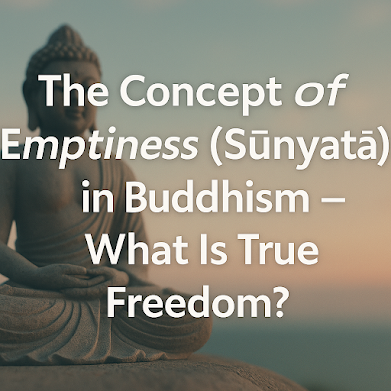The Concept of Emptiness (Śūnyatā) in Buddhism – What Is True Freedom?
At the heart of Buddhist philosophy lies one of its most profound and often misunderstood concepts:
Śūnyatā, commonly translated as "emptiness."
Far from suggesting nihilism or despair, the concept of emptiness offers a path toward ultimate freedom, liberation from suffering, and a deeper connection with the nature of reality itself.
In this article, we will explore what emptiness truly means in Buddhism and how it leads to genuine spiritual liberation.
1. What Is Śūnyatā (Emptiness)?
Śūnyatā, or emptiness, refers to the idea that all phenomena are empty of intrinsic, independent existence.
Nothing exists independently, in isolation.
Everything arises through causes and conditions, constantly interdependent and ever-changing.
✅ Key aspects of Śūnyatā:
-
No Self-Existence: Nothing possesses an unchanging, permanent essence.
-
Interdependence: All things exist in relation to other things.
-
Impermanence: Everything is in a state of constant flux.
📌 Emptiness is not "nothingness."
It is the realization that all things are fluid, interconnected, and free from rigid boundaries.
2. Why Emptiness Is Not Nihilism
One common misconception is that emptiness means that "nothing matters" or "nothing exists."
In truth, Buddhism teaches that emptiness makes life vibrant and meaningful.
Because nothing is fixed, change is possible.
Because there is no inherent separation, compassion, growth, and transformation are possible.
✅ Emptiness leads to:
-
Freedom from rigid identity and ego
-
Freedom from clinging and aversion
-
Freedom to experience reality directly, without distorted projections
📌 Emptiness is the space in which freedom blooms, not a void of despair.
3. Emptiness in Everyday Life
Understanding emptiness is not reserved for monks or scholars.
It has practical relevance for anyone seeking peace and clarity in daily life.
✅ Applications of Śūnyatā:
-
Relationships: Realizing that others are also ever-changing beings, not fixed labels or roles.
-
Self-Perception: Letting go of rigid self-definitions (e.g., "I am a failure," "I must always succeed").
-
Handling Emotions: Seeing anger, fear, or sorrow as temporary, conditioned states rather than eternal truths.
By seeing life through the lens of emptiness, we soften our attachments, reduce suffering, and open ourselves to greater compassion.
📌 To live with the awareness of emptiness is to dance with life’s constant flow, instead of resisting it.
4. True Freedom Through Emptiness
In Buddhism, true freedom is not merely the absence of external restrictions.
It is the inner liberation from clinging, craving, and fixed views.
When we realize that all things are empty of fixed essence:
-
We no longer cling desperately to possessions, achievements, or relationships.
-
We are not trapped by fear of loss or change.
-
We are free to love fully, act wisely, and accept life’s unfolding.
📌 Emptiness reveals that freedom is not something to be achieved in the future;
it is already present, hidden beneath layers of misunderstanding.
5. Emptiness and Compassion
Interestingly, compassion (karuṇā) arises naturally from understanding emptiness.
When we see that others, like ourselves, are empty of fixed identities and are shaped by conditions beyond their control:
-
We judge less and empathize more.
-
We offer kindness without rigid expectations.
-
We act not out of obligation, but out of deep connection.
True compassion, grounded in emptiness, is selfless and boundless.
Q&A
Q1. How can I start to understand emptiness in daily life?
A1. Begin by observing how everything—thoughts, emotions, people—changes and depends on conditions. Reflect on how little is truly fixed or permanent.
Q2. Does emptiness mean nothing matters?
A2. No. Emptiness enhances meaning, because it shows that everything is connected and precious in its impermanence.
Q3. Is emptiness the same as "no-self" (Anattā)?
A3. They are deeply related. No-self refers to the emptiness of an independent, permanent "I," while emptiness applies to all phenomena.
Q4. Can understanding emptiness reduce anxiety and fear?
A4. Yes. By recognizing that our fears are based on clinging to impermanent conditions, we can loosen their grip and find inner peace.

